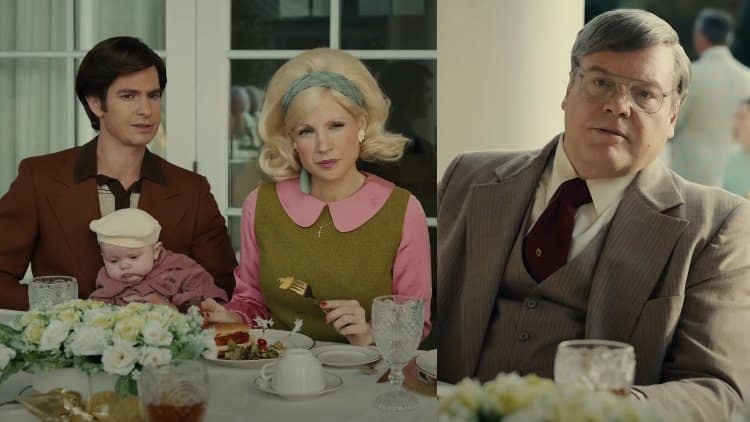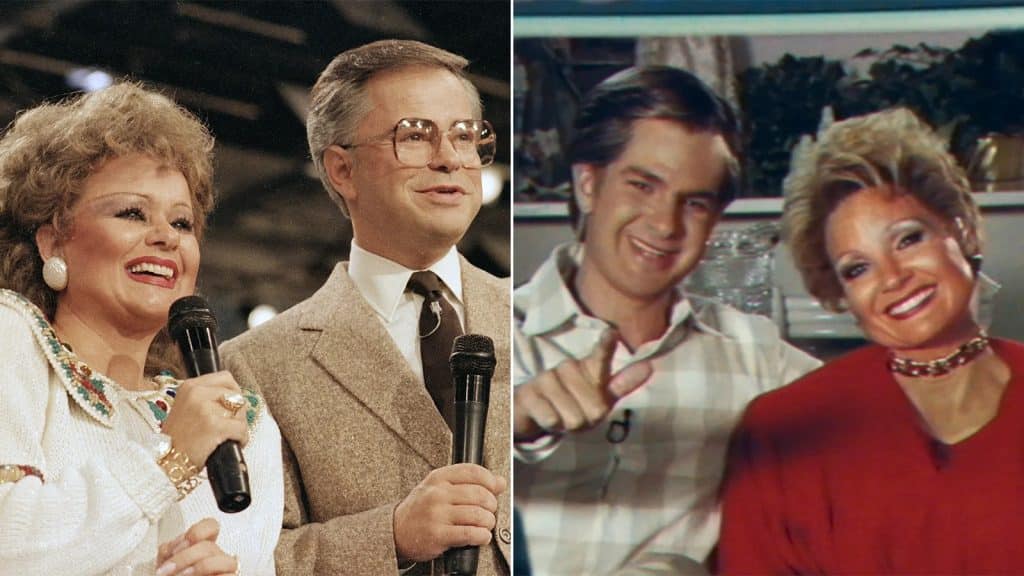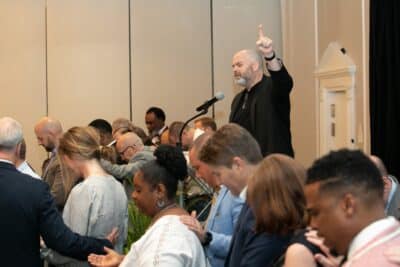Editor’s note: At the 94th Annual Academy Awards last night, religious-themed biopic “The Eyes of Tammy Faye” won two Oscars, for Best Actress (Jessica Chastain as Tammy Faye Bakker) and Best Makeup and Hairstyling (Linda Dowds, Stephanie Ingram, and Justin Raleigh).
“The Eyes of Tammy Faye” is a clearly affectionate but sadly generic and uninsightful look at the rise and fall of a powerhouse evangelical couple that captivated the media for decades: Tammy Faye (Jessica Chastain) and Jim Bakker (Andrew Garfield).
The Bakkers became some of America’s most famous and wealthy televangelists after co-founding the network PTL, which stood for “Praise the Lord” or “People that Love,” in 1974. Their empire of luxury cars, multiple expensive homes and a Christian theme park took a nose dive amid sexual scandal and financial fraud that landed Jim in prison and led to the couples’ divorce. Faye, remembered for her eccentric style and singing on PTL, died of cancer at age 65 in 2007.
Unfortunately, those seeking answers to why powerful evangelicals fall will find none here, making the experience of watching sweet people implode feel more voyeuristic than empathetic.
The last few years have reignited the broader society’s interest in evangelical Christians and their culture. The Christian right, with its supposedly staunch promotion of family values, befuddled the world by supporting the decidedly anti-family values Donald Trump for president, and the fall of multiple Christian leaders — like Ravi Zacharias and Mark Driscoll — to scandals of sexual abuse have prompted a whirlwind of think pieces, such as the incredibly popular “The Rise and Fall of Mars Hill” podcast by Christianity Today.
Your tax-deductible gift helps our journalists report the truth and hold Christian leaders and organizations accountable. Give a gift of $30 or more to The Roys Report this month, and you will receive a copy of “Hurt and Healed by the Church” by Ryan George. To donate, click here.
“The Eyes of Tammy Faye” is the first major studio attempt in recent years to wrestle with evangelical culture. Like many other artistic attempts to wrestle with a modern cultural crisis, it uses the past to try to provide insight into the present. As “The Crucible” used the witch trials to grapple with McCarthyism and “MASH” used the Korean War to grapple with Vietnam, “The Eyes of Tammy Faye” uses past Christian celebrity scandal and political power struggles to grapple with modern ones.
The film follows the life of the eponymous Tammy Faye’s childhood in a Pentecostal Christian community, her marriage to Bakker, their rise as a Christian televangelist power couple and their eventual fall from grace amid her husband’s affair and embezzlement scandal. Faye divorced Bakker while he was in jail in 1992 and married one of his business associates, Roe Messner, in 1993.
There is clearly a lot of affection for Faye and for many of the Christians around her shown in ways that Hollywood doesn’t often grant to Christians in its films. Faye, her mother and Bakker are portrayed as sincere in their faith, even when they disagree with how the others are applying it or succumbing to their flaws. Faye and her husband are shown to have a sweet and folksy charm, and their love together — particularly in their early days — is really very sweet.
And Faye’s extremely serious Christian mother, who in other films would be written off as legalistic and oppressive, is shown to sometimes be very wise to the dangers of the life Faye is leading even when Faye herself is not. Moreover, the film makes it clear through the observations of Faye and Bakker that they fell not because of their belief in God but because they got distracted from their faith in God — one that is restored by their fall from grace.
This affection for Faye is evident in the way those involved in the film spoke about her. Michael Showalter noted this to Vanity Fair:
“A big part of what was interesting to all of us is that she’s (Faye) kind of misunderstood or misrepresented; that she was this kind of laughing stock. For a long time that’s how the culture viewed her, as this comic character. … But she was really trailblazing in a lot of ways, and she was really true to her beliefs in a lot of ways. And she was a survivor.”
Jessica Chastain echoed these sentiments in an interview with ET Canada:
“The fact that we vilified her for the makeup she wore and how she looked instead of listening to what she was saying about love, what she was saying about religion, about Christians, and about what Christianity is supposed to be about; how she was reaching across and really trying to love those who feel like they’ve been abandoned. It broke my heart that she was never acknowledged for that. She was just made into a joke. Even now when you mention Tammy Faye, people say, ‘Oh yeah, she’s singing and there’s mascara running down her face.’”
The attention to detail in the performances and recreations of Faye’s and Bakker’s looks and mannerisms is also incredibly impressive and shows a great deal of love and respect for the subjects. I was too young to be aware of any of these people at the time they were famous, but those older than me who do remember them are often shocked by how well they’ve captured them.

But while the filmmakers seem to like their subjects, they don’t seem interested in understanding them. There is no apparent attempt to explore why these characters are the way they are, why they are so different from other people — Christian and non-Christian alike — and why they make the tragic choices they do. How did Tammy Faye come to her big open-hearted view of God when it was nowhere in her church upbringing, her college or the Christian TV and political community that she entered as an adult? What were the Shakespearean flaws in her and her husband’s beliefs and/or characters that made them susceptible to their ultimate downfall?
The movie ignores any deeper probing questions into the characters beyond the surface level of this or any kind. I felt like I understood the marginalized and mentally ill in society better after watching “Joker” than I understood my fellow Christians after watching “The Eyes of Tammy Faye.” This brings up the question, “Why make this movie?” since understanding why evangelicals fall is a huge reason I imagine most people would be interested in watching it.
Not attempting to understand or explain the characters has a couple of uncomfortable consequences. Because we may like the characters but don’t relate to them, their over-the-top folksy and super-spiritual flamboyance make us feel more like we’re watching animals in a zoo rather than people we can connect with. It becomes, in other words, awkwardly exploitative rather than loving.
Additionally, since we are watching people who stumble and fall, it starts to feel rather unintentionally mean-spirited. We chuckle at the kookiness of these people and watch as their lives fall apart in excruciating detail, fully comfortable that their sins and troubles have nothing to do with us. But this also makes the film feel more nasty, like kids laughing at the nerds at the other lunch table when they slip in the cafeteria.
The deeper problem with making us unable to relate to or understand these people, though, is it perpetuates the idea that abusing power is something that other people do but we don’t. Hollywood and the wider culture has a problematic tendency to scapegoat evangelicals for ills of society that are shared by the rest of it. There are no shortages of either secular and religious people who have fallen into sex, fraud and abuse, but Hollywood tends to focus on the ones it can’t be implicated in.
Hollywood made the movie “Spotlight,” a film about the sex abuse in the Roman Catholic Church, at the same time the film industry was still hiding its own sexual abuse culture. When Hollywood finally made a major movie about the #MeToo movement, it made it about Fox News and how the conservative culture was to blame for abuse. This is bad for the cultural conversation because it prevents us from finding real answers to the problems of power and abuse by making these problem about religion or politics rather than their actual driving factors.

Paradoxically, “The Eyes Of Tammy Faye” seems to have a rather off-putting desire to protect Faye specifically from any true culpability. Leaving aside the facts of Faye’s life and judging it purely as a film, in every scene where shady stuff is happening, the film makes clear that Faye was either oblivious to what was going on, being manipulated or so wronged that what she did was excusable.
Faye’s affair in particular seems melodramatically contrived to elicit our sympathy. It often comes across like the way a teenage “mean girl” like Regina George would recount the story of something bad she did to make herself the real victim. I don’t know if this is because of her work on behalf of the LGBTQ community or some other reason that made the creators want to exonerate her from any guilt in the audience’s minds, but the effect feels deeply insincere.
Beyond these deeper thematic concerns, the film is just generally boring. The filmmaking choices — from the camerawork to the acting — are all the generic ones you would expect from your typical Oscar-bait drama film with seemingly no extra thought put into it. Even more puzzling, the film is paced so as to rush through the beginning where we should be getting to know the characters yet shift to a snail’s pace when they’re getting to their fall from grace — a plot that we’ve seen in a dozen other movies.
There are moments, particularly at the end, where you see some brilliance and get a glimpse at what a different, more interesting movie could have been. Faye’s and Bakker’s repentance and Faye’s moments with her father at the end are heartfelt and would have been deeply moving if they had been better set up. And the sharp contrast between Faye’s inner and outer life at the end in her showstopper number use the energy and clever filmmaking in the service of empathy that a great movie should have.
I applaud Hollywood’s attempt to explore culturally prominent American Christians’ beliefs and communities and wrestle with the tough questions that they pose while being sympathetic to those communities. I hope that they continue to do so in the future with greater success and insight. The intentions of the filmmakers behind “The Eyes of Tammy Faye” seem to have been good, much like their portrayal of Tammy Faye herself. But also like Faye, they may have lost sight of their priorities.
This article originally appeared at Religion Unplugged.
Joseph Holmes is an award-nominated filmmaker and culture critic living in New York City. He is co-host of the podcast The Overthinkers, where he discusses art, culture and faith with his fellow overthinkers.




















8 Responses
Jim Baker and those like him really discredit evangelicalism.Its all about money and political power. Evangelicals generates 22 billion a year ! And their non profit!!! From what I see not a lot is done to put a dent in homelessness which the big banks and wall streets fraud of 2008 increased considerably ! More Christians should speak out against this self enriching industry.And I think their tax free status should be questioned!
It sounds like this author has a lot of “sympathy for the devil” concerning Tammy Faye. I was a struggling college student and baby Christian in the mid-seventies. I was naive to wolves in sheep’s clothing, and was manipulated by Jim and Tammy’s tears. They always said that they were going to lose their ministry as they went, I so even though I was puzzled by Tammy’s jewels as she literally cried poverty, I’d send them $20 and more every month out of my monthly (meager) Social Security check (my father had died when I was 15, and kids could still draw their dad’s SSA checks if they went to college). I could kick myself now!!!
You were tithing which is biblical, they were incorrectly using the money which is not biblical. Do not kick yourself, you were doing the right thing at the time.
Julie. Read a book called THE FAMILY. It’s about the group that puts on the presidential prayer breakfast each year since Eisenhower. On the surface they look like a good Christian group. Behind the scenes they are the true power behind evangelicals. A lot of good they do, but much is evil. Their reasoning for supporting dictators is a very perverted use of scripture. And with there power no member of Congress or the senate will ever touch the tax issue third rail.
I think Tammy was fully aware of what Jim was doing. They both did lots of spiritual damage. Also IMO Jim should have stayed in prison many more years.
I remember Jim and Tammy Faye Bakker very well, including their opulent dog house and how they wasted money on lavish possessions and a luxurious life style. To be discerning about whether certain evangelicals are or were true Christians, one must compare their values, life style and actions with that of Jesus Christ, whom they claim to follow but fail to emulate in their daily lives. What would Jesus Christ think of “Evangelicals” who love money, riches, fame and power more than they love God? Have they not already received their rewards here in this world and so what will be in store for them in heaven? How are they able to claim to be Christians when they are motivated by greed, power, and fame? Those “Christians” that follow such Christian evangelicals are sharing their values and are impressed by their fame, glory, self-promotion, and wealth. They need to reflect and critically review their own values and why they are drawn to such types of so called Christian leaders.
Pamela. What gets the evangelical industrial complex juices going nonstop is very simple. People are more afraid of them than God. I’ve listened to so many with there tithe speech and in some cases absolutely sounds like they are saying that to not give 10% each week God will get you, you terrible sinner. And people believe and give in fear not as a cheerful giver as Jesus said to do. I’ve studied tithing and it’s so distorted it’s actually a sad commentary to Christianity. And look at the life styles of these evangelicals. I remember reading that the people who ran and owned TBN was asked by there granddaughter why gramma had a 100k air conditioned mobile home for her dogs or why they owned three mansions and call them parsonages. people are so desperate to have an earthly faith that they forget our reward is in heaven. BTW, an old eighties slogan was, he who dies with the most toys wins, seems to be the new slogan for the evangelical industrial complex. Very sad.
The Christian right, with its supposedly staunch promotion of family values, befuddled the world by supporting the decidedly anti-family values Donald Trump for president,
Voting often involves picking the most tolerable candidate. I am a Christian that votes for flawed candidates with the best positions and policy. That should not “befuddle” anyone. Killing babies in the womb is the most anti-family value possible.